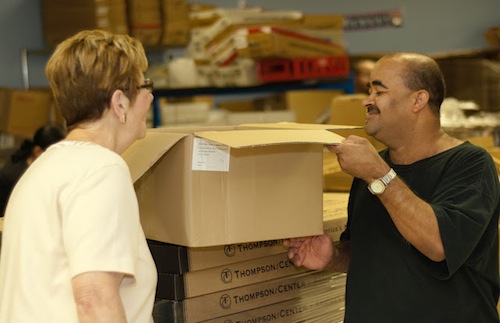


Businesses use contract services organizations that employ people with disabilities because of the results. (Photo courtesy of Paige Connors, American Training, Inc.)
When the Maine Chamber of Commerce and the state departments of labor and health and human services held their conference in Freeport demonstrating the value of employing people with disabilities to area businesses earlier this month (which we touched on to make a point about outsourcing to Americans), Portland’s television station, WCSH channel 6, was there to capture footage of people listening intently, and officials extolling the virtues of these employees and the benefits experienced by national employers like Walgreen’s and Proctor & Gamble as well as local outfits.
But the NBC affiliate also sent reporter Chris Rose and a camera crew further inland to the town of Turner, Maine, for an in-depth look at a contract services business that is “thriving” by performing work for “hundreds of companies around the country.” The footage from that segment makes a compelling case for hiring people with disabilities to perform sorting, packaging, assembly, and other manual tasks.
Rose says the opportunity for this historically underemployed population makes them “more motivated than most” to be good employees and deliver quality work. Allan Flagg, seen working with a chop saw, gets some camera time to tell Rose what he feels like after finishing a job for a customer:
Absolutely ecstatic. It’s great positive energy here, you know? There’s a few times you can get a little frustrated with what your trying to do; especially if you’re trying to be a perfectionist like I am.
Allen and his colleagues no doubt prefer the frustration of trying to do a job well over the frustration of not being able to find employment because they are individuals with disabilities. But while some may view the work performed by contract labor services as a social benefit program, Rose is quick to point out that there is no difference in the expectations for these employees than there would be at any other business. Workers are expected to perform their tasks at a high level and adhere to the guidelines for punctuality and appropriate workplace behavior.
Ultimately, the people with disabilities working in contract labor are judged by market forces that reward good work delivered on time, making these people exactly what they hope to be: regular citizens making a living. As one of the organization’s leaders, Kevin Ellingwood, tells Rose:
They are taxpayers, they are supporting their communities through work and paychecks and a sense of self-worth and individuality.
Comments?